I've been studying rocket-chip for utilizing diplomacy and I have a decent grasp on the overall structure of how diplomacy works. (I don't understand it totally, but well enough to create some examples on my own). I would like to develop some IP in which the main objective is to have a regmap through the use of a *RegisterRouter.
If I use/modify one of the RegisterNodeExamples from rocket-chip, I get the following:
class MyDeviceController(implicit p: Parameters) extends LazyModule {
val device = new SimpleDevice("my-device", Seq("tutorial,my-device0"))
val node = APBRegisterNode(
//address = Seq(AddressSet(0x10028000, 0xfff)), (Modified since not in APBRegisterNode)
address = AddressSet(0x002000, 0xfff),
//device = device, (Removed since not in APBRegisterNode)
beatBytes = 8)
lazy val module = new LazyModuleImp(this) {
val bigReg = RegInit(0.U(64.W))
val mediumReg = RegInit(0.U(32.W))
val smallReg = RegInit(0.U(16.W))
val tinyReg0 = RegInit(0.U(4.W))
val tinyReg1 = RegInit(0.U(4.W))
node.regmap(
0x00 -> Seq(RegField(64, bigReg)),
0x08 -> Seq(RegField(32, mediumReg)),
0x0C -> Seq(RegField(16, smallReg)),
0x0E -> Seq(
RegField(4, tinyReg0),
RegField(4, tinyReg1)))
}
}
I'm using APB at the moment as I'm very familiar with AMBA protocols and it has the smallest code base under the diplomacy package. And I could make is so either of the AMBA or TL protocols are used later.
My Question
Is there a way to generate verilog just for MyDeviceController as a stand alone component?
I have not been able to figure this out if there is. Obviously if I just try to instantiate MyDeviceController I will get an error for the inward parameters of node not being connected. I'm not sure if you can give a "dummy" node connection? Or if there is some method that can handle that.
Why I want to do this
It is desirable to test the IP standalone in it's own test environment without a full SoC.
My Current Workaround/Solution
To work around this I essentially created a "wrapper" that creates an APBMasterNode and connects to the APBRegisterNode in MyDeviceController.
class APBMaster()(implicit p: Parameters) extends LazyModule {
val apbMasterParameters = APBMasterParameters(
name = "apbMaster"
)
val apbMasterPortParameters = APBMasterPortParameters(
masters = Seq(apbMasterParameters)
)
val node = APBMasterNode(
portParams = Seq(apbMasterPortParameters)
)
lazy val module = new LazyModuleImp(this) {
val io = IO(new Bundle {
val wtf = Output(Bool())
val start = Input(Bool())
})
val myreg = RegInit(0.U(16.W))
myreg := myreg + 1.U
val prdata = Wire(UInt(64.W))
prdata := node.out.head._1.prdata
//seems to need these things to generate the logic
io.wtf := node.out.head._1.pready && !(node.out.head._1.prdata === 0.U)
node.out.head._1.pstrb := 63.U
node.out.head._1.pprot := 0.U
when(myreg(3,0) === 8.U && io.start) {
node.out.head._1.paddr := myreg
node.out.head._1.psel := true.B
node.out.head._1.penable := false.B
node.out.head._1.pwrite := true.B
node.out.head._1.pwdata := myreg + 1.U
} .elsewhen(myreg(3,0) === 9.U) {
node.out.head._1.paddr := myreg
node.out.head._1.psel := true.B
node.out.head._1.penable := true.B
node.out.head._1.pwrite := true.B
node.out.head._1.pwdata := myreg
} otherwise {
node.out.head._1.paddr := 0.U
node.out.head._1.psel := false.B
node.out.head._1.penable := false.B
node.out.head._1.pwrite := false.B
node.out.head._1.pwdata := 0.U
}
}
}
One issue with this, was that I had to create some controls for each of the APB signals. If I did not, the Chisel/FIRRTL compiler/generator would not create any Verilog for MyDeviceController. This is what you see above with the myreg counter being used to do some basic APB transaction.
The wrapper would look like the following:
class APBTop()(implicit p: Parameters) extends LazyModule {
val master = LazyModule(new APBMaster)
val slave = LazyModule(new MyDeviceController()(Parameters.empty))
slave.node := master.node
lazy val module = new LazyModuleImp(this) {
val io = IO(new Bundle {
val busy = Output(Bool())
val wtf = Output(Bool())
val start = Input(Bool())
})
io.busy := true.B
io.wtf := master.module.io.wtf
master.module.io.start := io.start
}
}
I can create this wrapper/master as a typical testing component, then in my testenv just instatiate the MyDeviceController RTL, however I was wondering if there was another solution. It appears that diplomacy is fairly holistic (which I understand why), but was looking for suggestions on how IP level development is tackled for a Diplomatic infrastructure flow.
Thanks
